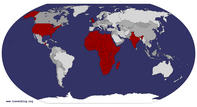Advertisement
Published: February 2nd 2008
KNYSNA
PART III
BOWLED OVER
Perhaps she never wears shoes. I can’t be certain, but I suspect it might be so.
“It took them a while to get used to me,” Karen Hendricks says, “I mean, they probably thought, ‘Who is this crazy barefoot Rasta coming up and telling us that we can build a brand new school right here in this old place where there is nothing but garbage.’ But I kept coming back and coming back. And now look at what we have!”
And indeed we are looking at Karen Hendricks’ dream fulfilled, a beautiful, brand new building and surrounding gardens called Bongani Daycare Creche. There is an ocean of warm smiles within. But I’m getting ahead of myself.
Sister Karen calls out my name. She is standing on the street below Sister Kerri’s house in Judah Square. It dawns on me that I haven’t addressed this many women by the title of “sister” since I tied a nun to chair with her own rosary beads in the seventh grade. I have been drawing many religious parallels in the past twenty-four hours, but that’s a topic for another day.
I
lock the door in my little room, drop the key off with Brother Maxi’s wife, and climb down the hill to introduce myself to Sister Karen. She is twirling a long stalk of grass in her fingers. Somehow it gives her the immediate look of approachability. She’s dressed in a long light brown skirt and darker brown top, of course she is shoe-less, and her dreads are bundled up inside a white crocheted cap. Flashes of red, yellow and green are applied to her dress and woven into her cap. Her smile is soft, her skin caramel.
“We can wait for a taxi to go to the first crèche.”
“Is it far?”
“Not so far.”
“Can we walk? I don’t mind walking.”
“Sure, let’s walk.”
Brother Zebulon’s dog Tsunmai follows us, along with another mongrel, and soon they is a wild squawking chicken chase that ends with all three disappearing into some low bushes.
Along the way Sister Karen begins to tell me a little about herself, and it’s clear that she is a self-starter with a built-in drive to help children and her community. When confronted with a problem she sees the solution simultaneously, the end outcome, and sets
off barefoot to accomplish it. She worked originally in Cape Town in the restaurant business and then was trained in Early Childhood Development. She still has a catering business, but her involvement with children really seems to drive her. In fact, the town of Knysna recognized her with an award just this past year, stating “she has a passion for early child development and has facilitated fundraising for three community crèches.”
“I want to show this crèche first, “ she says, still twirling the grass. “This way you’ll get an idea of the problems we are dealing with.”
The building is set at the bottom of a hill among other houses. It is shaded, dark really. A huge pine tree towers behind it, the green branches drooping with the weight of the long needles. The crèche has the look of a wretched doublewide trailer set in a poverty stricken hamlet of Maine.
Sister Karen leads the way gingerly along the side of the building, stepping on planks and ragged pieces of wood sunk into the soggy ground.
“Be careful, it’s very wet,” she says. “That’s the main problem here, the water just runs down the mountain right into this house.”
The building has been set exactly in the path of a natural drainage, with no engineering to divert the water. I can already see the rot and mold. Karen removes a broken stick that is holding the metal gate closed and enters the crèche.
“Hello,” she calls into the darkness as we step onto a spongy floor.
Inside are about eight or ten “babies,” about one to two years old. There are also two women attending them, and also one cook. The rooms are dark and smell of mold. Everywhere things seem to be broken and peeling. The carpet is soggy. This is one of the most depressing places I’ve ever been in. Dickens’ London looks like Oz compared to this place. By rights it should be condemned, and immediately I am thinking of asthma and lung damage.
A couple of the little ones begin to cry when they see me, while others are up and wanting to play.
They should not even be here, I say to myself,
they should not even be here! Remarkably the women are smiling brightly and seem very positive as they give their full attention to the little ones that are crying.
“We have
to get them out of here,” Sister Karen says, as if reading my mind, or anyone else's for that matter, who just saw this picture. “I am trying to get them moved up to the new crèche and have this building taken down, then build a new one. We have room for them up there already but we have to get approval, and that’s a slow process sometimes.”
We don’t stay too long, and just leaving these women and these children behind, walking away from them, seems like a monumental moment of injustice.
“It’s hard for me to see that,” Sister Karen says, “because I know there is a simple solution. You’ll see”
Drenched in the bright sunshine, we walk up the hill and away from the shadowed building. In this heat and light it seems impossible that there could be a place of dampness or darkness.
Then there is Bongani.
We stand in front of a proper gate, an opening through a fence that encloses perhaps an acre of land. The building and grounds within are the antithesis of where we have just been. It is high ground, and the long low building is almost gleaming. I can
see a garden with over a dozen tomato plants growing.
“You should have seen it before,” Karen says proudly, “The walls were falling down, there was animal waste everywhere, garbage. It was a real mess. It was just sitting there. But I could see this place. I could see it.”
When we walk through the gate Sister Karen’s son comes running up to greet her. Grace, the teacher, and her assistant, are standing in the shade of the building with all the children. There are over thirty of them, and they seem to be gathered for some sort of activity. I immediately unleash my camera and begin to snap. Oh, they are all camera hogs, all pushing to the front.
Sister Karen suggests that I take a group shot, a class picture. So they gather perfectly in front of their teachers and yell, “Cheeeeese” as I line up the shot. Snap, snap, snap.
Then I get down on my knees in the grass to get a different angle. I move in tighter. They are totally with me on this idea and move in also. I snap. They move closer. Snap. Soon they have knocked me onto my seat and are
all around me, like wagging puppies. Snap. Then I am bowled over altogether. Snap. Snap.
Karen shows me the room into which she wants to move the babies from the swamp down the hill. It is empty most of the time, used only once or twice a month by a counselor. The vision of this large, empty, unused room, superimposed on the one in my memory of the moldy house, makes me want to scream.
“It will happen,” Karen says.
Inside it is a picture of preschool perfection. Grace, the teacher, has an amazingly kind and open face. It almost glows. Her dedication is apparent, although she receives only one thousand Rand (about $150) a month for all her hard work. I’m not sure if Sister Karen receives a cent.
Now we walk higher up the hill in this township area. We are going to Sister Karen’s house for lunch. Cars and trucks buzz by while we walk, and Karen chats to people on the street. I don’t think we can get any higher on the road when she announces, “Here we are.”
Sister Karen’s rhomboid house sits on a narrow terrace carved into a steep hillside. The land
drops away precipitously but she and her husband have managed to make their life here, along with their three children. They once lived in the Rastafari Community of Judah Square until her husband told her that he would build them their own house. He took her to the top of this hill, told her that this was the spot, and commenced to build. They have no deed, no electricity, no running water, but they hope that they will some day. They are in the process of negotiating with the municipality.
We eat food cooked on an open fire, on coals gathered in metal pots - potatoes, squash, home made bread, salad. The table is set outside, garnished with fruit and fresh flowers. Flower petals and lemon slices float in the finger bowl. Karen’s husband, Brother Judah, sits with us and tells me of his dreams for the house. He taps lightly on a drum and chants Rastafari songs. I seek out a slice of shade. A hobo type man stands above us in the street and calls down in Afrikaans. They ignore him for a while and then shoo him away. Now school busses are passing and then stopping to
let out the uniformed students. Two of their children arrive and soon the relative post lunch peace and harmony is broken. There is a squabble over fruit, I think, or maybe bread, I can’t be sure. Some things are universal.
I soon realize that it’s serious “Mom time” now, and I mention how I should head back into town. I’ve been at the house for over two hours, and with Karen for almost four.
Sister Karen tells me that it’s been an amazing day for her.
“For you?” I ask, wondering how the amazement could be hers.
“Yes,” she says, “By showing you both places, and then seeing your reaction, I got to see things in a new light. It really is amazing isn’t it?”
For me, “amazing” is an understatement.
I descend from Sister Karen and Brother Judah’s house by mini bus taxi, the same way I arrived in the township yesterday. I’m in the back seat so I pass my coins up front to the woman sitting next to the driver. On the way down we pass remarkable views of the estuary and the ocean. But in my mind I see the decrepit crèche, then the face of
Grace and her children, and the rhomboid house of Sister Karen, and then finally flowers floating in water.
.
Advertisement
Tot: 0.226s; Tpl: 0.011s; cc: 13; qc: 68; dbt: 0.0669s; 1; m:domysql w:travelblog (10.17.0.13); sld: 1;
; mem: 1.3mb










beth
non-member comment
amazing
you and kristen are amazing - as are all these Sisters and children that live and learn here and find happiness in things we Westerners take for granted.... thank you for writing, though it kills me to read it.